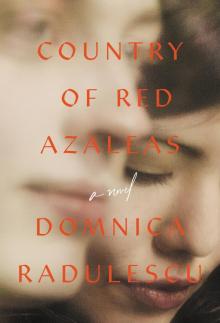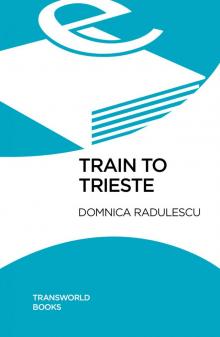- Home
- Domnica Radulescu
Train to Trieste Page 30
Train to Trieste Read online
Page 30
We drive on winding, rutted roads through little villages with stone houses and thick stone fences. The Carpathians, overlapping one another, wait patiently ahead of us in a pale blue haze. Radu plays the car radio, Romanian music, until it fades into static.
The music and the landscape wash over me in waves. The deep green countryside, the dirt roads, the women with babushkas standing in front of their gates watching the cars go by. Red and yellow flowers in the window boxes. Red tile roofs, white storks perched on the chimneys. I smooth out my white dress. I stare out of the window. I look at myself in my pocket mirror and adjust my lipstick. I look at my watch and count the hours.
Radu looks over at me. “It’s a long way,” he says. “Are you hungry? Do you want to stop?” I shake my head. He drives steadily, squinting a little.
The blue mountains never seem to get closer. We pass endless wheat fields rippling in the wind. The sun feels warm and soothing in my lap. The fields are full of people wearing brightly coloured clothes. I move among them as they welcome me with gifts: earrings, necklaces, scarves, apples and pretzels.
“We’ll get there in half an hour,” Radu announces. “You’ve slept quite a long time.”
I wipe the sweat off my forehead, the lipstick off my mouth, drink an entire bottle of water, and sit quietly for the rest of the ride, with my hands in my lap.
The landscape has become wilder, more primitive, as if we’re in some mythic time in the midst of rocky, uninhabited mountains. I think of the Smoky Mountains. I think of my white house in the midst of cornfields. I want to have an American and a Romanian house.
I stare at my red sandals and at my painted toenails. Mihai used to like the shape of my toes and sometimes kissed them one by one. But then they were never painted with bright red polish.
Radu takes out a slip of paper from his breast pocket and looks at some scribbled directions. He enters a little village of old stone houses with water wells in their front yards. He drives through it and turns onto another dirt road. At the end of the road, at the foot of a magnificent peak, is a pale green stone house with a wooden porch and a garden with climbing red clematis and grapevines all around. Mihai is sitting on a chair on the front porch, looking out into the woods and smoking. I get out of the car. I walk slowly towards the house. There is a waterfall on the side of the mountain that swallows up all sounds, including my own steps on the gravel.
Every quiet step seems like a huge leap over time and large spaces. I am walking on the thin gravel path leading to the house, and the contours of the man sitting on the porch appear clearer with every step. I have always laughed at movie scenes in which important encounters are filmed in slow motion. Now I feel like someone inside such a scene. Only this is not a scene. This is me, Mona, walking towards Mihai, who is sitting on the porch of a green house at the foot of a snowcapped peak deep in the Carpathians. His dream came true. He always spoke about living in a place like this.
There are wild red and blue flowers on the side of the gravel path. Mihai is wearing a blue shirt and green trousers. I have never seen him wear two bright colours at once. His hair is cropped tidily, and he has the beginning of a beard. There are grey patches in his short hair. The waterfall is getting louder, and Mihai hasn’t seen us yet. As I look at him with all the attention I am capable of mustering, I also see myself as if in a mirror: the lines around my eyes, my hair flying in all directions, my eyes in which Mihai used to see little stars at once a bit paler and yet more fierce than they used to be. I stumble over a pebble and I notice a slight, almost imperceptible shift in the position of his shoulders. I know that Mihai is finally aware of my presence, but he is taking his time.
A thought crosses my mind as I am getting close to the house and as I start going up the wooden steps. I should buy a house like this one with clematis and grapevines all around it and a wooden porch, here in the middle of the Romanian nowhere. For me and my children when we come back next summer. Mihai lets out a swirl of blue smoke and looks up. He looks at me.
THE END
Acknowledgements
In completion of my novel, three amazing women played the role of fairy godmother: first is my agent, Jodie Rhodes, who discovered me, stood by me, and whose extraordinary passion for her writers, her insights and integrity, should be a model to all those who practise her profession. Without her unrelenting belief in my ability as a writer and her irrepressible energy, my novel might never have seen the light.
The extraordinary writer Sandra Cisneros has touched my destiny in a magical way with her inspiring and brilliant mentoring, pushing me to transcend my own limits. She is the fairy godmother who guided me toward narrative complexity.
My brilliant editor, Robin Desser, is the fairy godmother who taught me to stay in the castle of storytelling clarity and not be chased out by redundancy and excess. With immense patience, devotion and intelligence, she has guided me toward making this book the best that it can be.
Dennis Mathis also deserves profuse thanks for his valuable insights, suggestions and editorial guidance. Our many conversations are remembered fondly.
I am also grateful to Ellen Mayock for her staunch professional support.
I owe many thanks to my dear friend Paul Friedrich for his sustained moral support and to my beloved mother, Stella Vinitchi Radulescu, for her precious advice and belief in my work.
About the Author
Domnica Radulescu won a national fiction-writing prize for a collection of short stories in Romania when she was just twenty but fled the country soon after to escape the Communist dictatorship of Nicolae Ceauşescu. She teaches French and Italian literature and Women’s Studies at Washington and Lee University in Virginia. She has authored many scholarly articles and books on European literature and theatre. She is currently working on her new novel.
TRANSWORLD PUBLISHERS
61–63 Uxbridge Road, London W5 5SA
www.transworldbooks.co.uk
Transworld is part of the Penguin Random House group of companies
whose addresses can be found at global.penguinrandomhouse.com
First published in Great Britain
in 2008 by Doubleday
an imprint of Transworld Publishers
Black Swan edition published 2009
Copyright © Domnica Radulescu 2008
Domnica Radulescu has asserted her right under the Copyright,
Designs and Patents Act 1988 to be identified as the author of this work.
Grateful acknowledgement is made to Alfred Publishing Co., Inc., Next Decade Entertainment, Inc., and S.A. Music Co. for permission to reprint an excerpt from ‘It’s Only A Paper Moon’, words by Billy Rose and E.Y. ‘Yip’ Harburg, music by Harold Arlen, copyright © 1933(renewed) by Warner Bros Inc., Chappell & Co., Glocca Morra Music and S.A. Music Co. All rights reserved.
This book is a work of fiction and, except in the case of historical fact,
any resemblance to actual persons, living or dead, is purely coincidental.
A CIP catalogue record for this book is available from the British Library.
Version 1.0 Epub ISBN 9781407036755
ISBN 9780552774741
This ebook is copyright material and must not be copied, reproduced, transferred, distributed, leased, licensed or publicly performed or used in any way except as specifically permitted in writing by the publishers, as allowed under the terms and conditions under which it was purchased or as strictly permitted by applicable copyright law. Any unauthorized distribution or use of this text may be a direct infringement of the author’s and publisher’s rights and those responsible may be liable in law accordingly.
Addresses for Random House Group Ltd companies outside the UK can be found at: www.randomhouse.co.uk
The Random House Group Ltd Reg. No. 954009
2 4 6 8 10 9 7 5 3 1
&
nbsp;

 Country of Red Azaleas
Country of Red Azaleas Train to Trieste
Train to Trieste